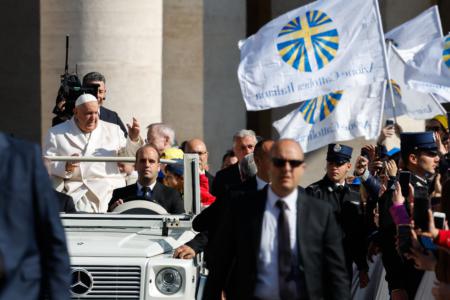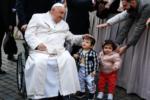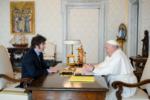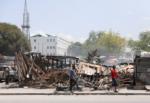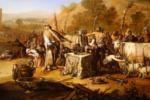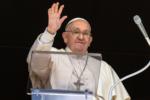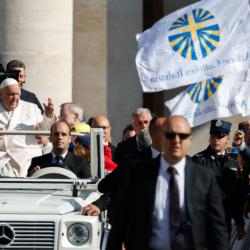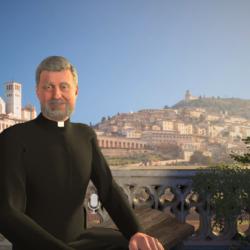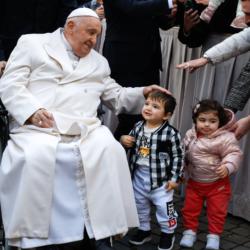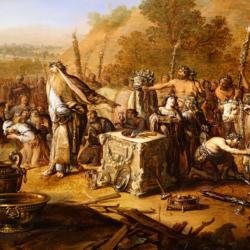A vocation to the peripheries
It began as a typical movie night. "God Bless the Child" was ABC's Sunday Night Movie on March 21, 1988, and on a whim, Jim Orcutt and his wife Terry decided to watch. But Jim and Terry's hearts had been prepared by then -- by the challenges of their past, and a Cursillo retreat which ignited their faith -- for the grace of the Holy Spirit to move them by what they saw. A conversation going well into the night ended with a prayer: "God, we want to bring your love and hope to people who are feeling lost and hopeless, but we don't know what to do. If you'll guide us, there will never be another day when this won't be first." My Brother's Keeper was born.
The couple began by first collecting clothes, and then furniture and housing items to be distributed out of their basement with a borrowed roof rack for their truck, with change collected from bottle returns covering the extra gas. Their ministry has been wildly successful by all measurable standards: today, My Brother's Keeper has 5,000 volunteers and 15 employees, working together in two modern warehouse facilities and making more than 18,500 deliveries each year of food, furniture, housing items, and Christmas gifts. But ask anyone involved with My Brother's Keeper, from the founders to the current president, Erich Miller, to the volunteers driving the trucks, and they will all be quick to tell you: their ministry is not about the goods they deliver.
In a world so quick to focus on what we "do" -- and how successful we are in that "doing" -- My Brother's Keeper keeps their focus on who they serve: Christ first and foremost, and then their neighbors through Him. The furniture and food are "how" they love, serving as the necessary and tangible sign for the people who receive the goods. Christ stays central as the WHY of their love. "We're not in the furniture business," Jim will say, "we're in the love and hope of Jesus Christ business."
Their mission statement reflects the organization's laser-like focus: To bring the love and hope of Jesus Christ to those we serve. "Mission is not what you do," says Jim, "but why you exist." At My Brother's Keeper, the mission is spoken twice each day, following the workday's opening and closing prayer time. Similarly, all the policies and procedures of the organization, now incorporated by the board, have grown out of and remain true to this focus.
I spent a day at My Brother's Keeper, and was taken aback by the introduction and applause I received before Morning Prayer ... but then everyone is applauded at My Brother's Keeper! The unexpected miracle of this organization, says Miller, is how it serves the people who serve, and I saw evidence of this everywhere I looked.
Upstairs, women -- many in their 70s and 80s -- were making box springs for mattress deliveries, several cutting the cloth patterns, others chatting over humming sewing machines, and still others pulling the fabric over the frames and securing it with an electric staple gun. I was told how this group of women have become family, occasionally going on day-long outings together, and supporting each other through the pandemic. A couple of talented women sat to one side, creating beautiful gifts out of donations of cups and saucers, teas and soaps, to be included in the deliveries so as to make recipients know that they were being thought of.
Downstairs, where others were packing "standard" crates of kitchen items, as well as filling orders for more specific needs, the camaraderie was the same, evidenced in the laughter and joyful conversation, and by little intimacies -- knowing who ate a piece of chocolate every day with her tea, and who would want pickles with her lunch. Their joy spilled over to embrace me, the otherwise outsider.
Meanwhile, pickups and deliveries of furniture and food packed on site came and went in the background, facilitated on this day by a rotating group of men. Easton Site Director Ryan Thorley was a peaceful guide, making managing a myriad of activity and details look easy, as all the staff does. I was privileged to be the only woman in the van as we delivered furniture in the morning, and food in the afternoon. As we exited the van to deliver a crib and dresser to a pregnant mom, her face relaxed and smile widened as we spoke; her baby was due on my daughter's birthday, and she showed me the baby clothes she had carefully washed and organized as she waited for the dresser's arrival.
As we drove to the woman's address, that day's driver told me he was at first taken aback by My Brother's Keeper's "no questions asked" policy of service, even if someone was suspected of selling the furniture that was delivered. And it is true: No one seeking assistance has to provide anything other than their name and their presence at their home address when deliveries are made. As with many of the policies at My Brother's Keeper, this began by searching scripture. Looking at the miracles of Christ, Jim and Terry noticed that Jesus never asked for a reason before helping someone . . . All he asked was, "What do you want from me?" His miracles were proof of his word, which was of God's love and forgiveness.
The miracle of a household of furniture and home supplies is proof of My Brother's Keeper's word, grounded in Christ's. And after each delivery is complete, recipients are given a crucifix for their home and told "We're just the delivery people. This is the person who sent you the furniture." This our driver did for the woman preparing her home for her baby. After handing her the crucifix, he continued with a wink: "Do you know that guy's name?" She held the crucifix to her chest: "Yes! It's God!"
My Brother's Keepers "no questions asked" policy not only honors the dignity of those seeking help, but it unleashes a flood of generosity in the hearts of those working at the organization. In a culture that often asks us to be cautious in how we give -- worrying about how one might use what we give, or whether we are being scammed -- the no questions policy invites individuals to give freely of themselves, mirroring the love of God, who does not withhold the air we breathe and the gifts given us based on our behavior (thank God!). Because of this policy, they can take no federal or state money, but it also allows them to do things like give away the crucifix. Later, when we were delivering food, a recipient asked for "Jesus" -- just like that, the word of God spreads!
Further respecting the inherent dignity in those they serve, all the vans My Brother's Keeper uses for deliveries are unmarked. In their early days, Terry was riding in the delivery truck a week before they were going to have "My Brother's Keeper" painted on the vehicle. That day, they delivered to a family whose neighborhood was full of life -- kids running around in the street, adults in and out of their doors. They met the children of the house they were delivering to; the family had just moved in from a shelter and were sleeping on blankets on the floor. She realized at that moment that if their organization's name was on their trucks, everyone would feel this family was getting a handout. She told her husband to call the person who was to paint the names and "tell him never mind." Federal law requires commercial vehicles to have some identifying signage on them, so on theirs you will see a small MBK with a phone number -- they could be anybody's moving company. And when their trucks arrive at a home for delivery, they never open the bed until they have knocked on the door and talked to the residents, keeping central what Pope Francis calls a "culture of encounter," of relationship.
As My Brother's Keeper grew and more people became a part of its mission, so came donors wanting to create an endowment. Quoting scripture, the founders will say: "Jesus had no money ... and when he sent out his disciples, he told them to carry nothing, not even sandals!" From this truth grew a policy that prohibits My Brother's Keeper from accumulating excessive funds, and therefore having an endowment. While exercising good stewardship by keeping a modest operating reserve and funds to care for their two facilities, this policy keeps My Brother's Keeper lean, efficient, and accountable to its supporters. Moreover, it's a reminder that in all things, God is our Provider ... it is a call to faith.
Erich Miller will tell you that My Brother's Keeper is the "product of community." "By getting people involved and engaged in who we are, we create a diverse base of support and this helps keep us stay sustainable" he says. But Erich also cites it again as a miracle, "God at work in Easton and now Dartmouth," evident by the people -- some now third- and fourth-generation families -- who come to join them in the work, living out the gospel in a way that builds upon and enriches faith and worship. Erich himself is an example, having moved his family across the country in order to be a part of this special adventure in faith and trust that is My Brother's Keeper. Time and again they are asked, "What if the money doesn't come in?" And they will say, "This is God's ministry, and we believe God will therefore support it. And if in God's good wisdom God doesn't want the ministry to continue, then it will be over." Let's hope that's not any time soon.
TANYA RYBARCZYK IS THE PROGRAM MANAGER FOR IGNATIAN VOLUNTEER CORPS, NE, WHICH PARTNERS VOLUNTEERS, AGES "50 AND BETTER," WITH NON-PROFITS FOCUSING ON UNDERSERVED POPULATIONS IN THE BOSTON, WORCESTER, AND PROVIDENCE AREAS, WHILE OFFERING COMMUNITY AND REFLECTION IN THE IGNATIAN TRADITION. TO LEARN MORE, VISIT IVCUSA.ORG, OR FIND TANYA AT: TRYBARCZYK@IVCUSA.ORG.
